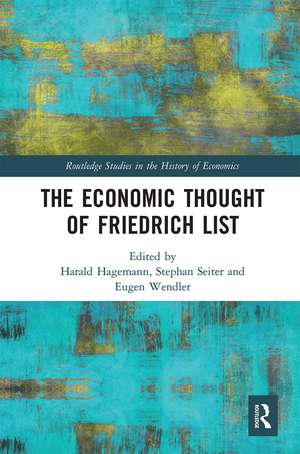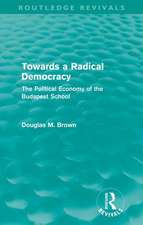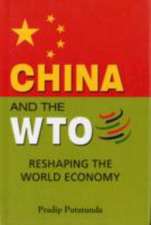The Economic Thought of Friedrich List: Routledge Studies in the History of Economics
Editat de Harald Hagemann, Stephan Seiter, Eugen Wendleren Limba Engleză Paperback – 30 sep 2020
Comprising fifteen specially commissioned chapters from a range of international scholars, this book explores many aspects of List’s economic thought, including industrial development, political economy, the economics of education, infrastructure and catching-up processes in Asian economies.
This volume will be illuminating reading for advanced students and researchers in the history of economic thought, economic history, economic policy and international trade.
| Toate formatele și edițiile | Preț | Express |
|---|---|---|
| Paperback (1) | 389.38 lei 6-8 săpt. | |
| Taylor & Francis – 30 sep 2020 | 389.38 lei 6-8 săpt. | |
| Hardback (1) | 1000.27 lei 6-8 săpt. | |
| Taylor & Francis – 22 noi 2018 | 1000.27 lei 6-8 săpt. |
Din seria Routledge Studies in the History of Economics
-
 Preț: 370.72 lei
Preț: 370.72 lei -
 Preț: 302.54 lei
Preț: 302.54 lei - 8%
 Preț: 392.82 lei
Preț: 392.82 lei -
 Preț: 311.28 lei
Preț: 311.28 lei - 9%
 Preț: 1003.10 lei
Preț: 1003.10 lei -
 Preț: 665.68 lei
Preț: 665.68 lei - 9%
 Preț: 935.39 lei
Preț: 935.39 lei -
 Preț: 384.63 lei
Preț: 384.63 lei -
 Preț: 280.74 lei
Preț: 280.74 lei -
 Preț: 326.99 lei
Preț: 326.99 lei -
 Preț: 318.31 lei
Preț: 318.31 lei -
 Preț: 214.15 lei
Preț: 214.15 lei -
 Preț: 310.43 lei
Preț: 310.43 lei -
 Preț: 326.82 lei
Preț: 326.82 lei -
 Preț: 308.97 lei
Preț: 308.97 lei -
 Preț: 324.46 lei
Preț: 324.46 lei -
 Preț: 395.81 lei
Preț: 395.81 lei -
 Preț: 392.71 lei
Preț: 392.71 lei - 26%
 Preț: 850.91 lei
Preț: 850.91 lei - 27%
 Preț: 995.39 lei
Preț: 995.39 lei - 18%
 Preț: 1005.01 lei
Preț: 1005.01 lei - 18%
 Preț: 1002.60 lei
Preț: 1002.60 lei - 26%
 Preț: 1046.46 lei
Preț: 1046.46 lei - 18%
 Preț: 1280.31 lei
Preț: 1280.31 lei - 18%
 Preț: 1055.51 lei
Preț: 1055.51 lei - 18%
 Preț: 1055.51 lei
Preț: 1055.51 lei - 28%
 Preț: 987.72 lei
Preț: 987.72 lei - 25%
 Preț: 824.17 lei
Preț: 824.17 lei - 18%
 Preț: 1061.93 lei
Preț: 1061.93 lei - 18%
 Preț: 716.32 lei
Preț: 716.32 lei - 18%
 Preț: 1006.07 lei
Preț: 1006.07 lei - 18%
 Preț: 1069.92 lei
Preț: 1069.92 lei - 12%
 Preț: 342.67 lei
Preț: 342.67 lei - 26%
 Preț: 991.34 lei
Preț: 991.34 lei - 18%
 Preț: 1056.00 lei
Preț: 1056.00 lei - 18%
 Preț: 1076.53 lei
Preț: 1076.53 lei - 18%
 Preț: 698.08 lei
Preț: 698.08 lei - 22%
 Preț: 332.02 lei
Preț: 332.02 lei - 18%
 Preț: 1169.78 lei
Preț: 1169.78 lei - 18%
 Preț: 1059.84 lei
Preț: 1059.84 lei - 30%
 Preț: 852.88 lei
Preț: 852.88 lei - 25%
 Preț: 830.10 lei
Preț: 830.10 lei - 18%
 Preț: 1125.78 lei
Preț: 1125.78 lei - 18%
 Preț: 1062.98 lei
Preț: 1062.98 lei - 18%
 Preț: 847.96 lei
Preț: 847.96 lei - 18%
 Preț: 953.01 lei
Preț: 953.01 lei - 18%
 Preț: 1168.76 lei
Preț: 1168.76 lei
Preț: 389.38 lei
Nou
Puncte Express: 584
Preț estimativ în valută:
74.51€ • 77.79$ • 61.66£
74.51€ • 77.79$ • 61.66£
Carte tipărită la comandă
Livrare economică 04-18 aprilie
Preluare comenzi: 021 569.72.76
Specificații
ISBN-13: 9780367664497
ISBN-10: 0367664496
Pagini: 266
Dimensiuni: 156 x 234 x 14 mm
Greutate: 0.45 kg
Ediția:1
Editura: Taylor & Francis
Colecția Routledge
Seria Routledge Studies in the History of Economics
Locul publicării:Oxford, United Kingdom
ISBN-10: 0367664496
Pagini: 266
Dimensiuni: 156 x 234 x 14 mm
Greutate: 0.45 kg
Ediția:1
Editura: Taylor & Francis
Colecția Routledge
Seria Routledge Studies in the History of Economics
Locul publicării:Oxford, United Kingdom
Public țintă
Postgraduate and UndergraduateCuprins
Introduction Harald Hagemann, Stephan Seiter and Eugen Wendler 1. Friedrich List's Seven Deadly Economic Sins Eugen Wendler 2. Friedrich List: Looking Back to the Future Dieter Senghaas 3. Growth and Integration: Why We Should Re-Read Friedrich List Stephan Seiter 4. Friedrich List and National Political Economy: Ideas for Economic Development José Luís Cardoso 5. German, American and French Influences on List’s Ideas of Economic Development Harald Hagemann 6. Friedrich List and France: The History of a Lifelong Engagement Mechthild Coustillac 7. Friedrich List’s 'Economics of Education' Stefano Spalletti 8. Manufacturing Matters: From Giovanni Botero (c. 1544–1617) to Friedrich List (1789–1846), or: The History of an Old Idea Philipp Robinson Rössner 9. Two Early Views on Railway Regulation in Germany: Friedrich List and David Hansemann Bernhard Wieland 10. Friedrich List and the Non-financial Origins of the European Crisis Erik S. Reinert and Rainer Kattel 11. Noboru Kobayashi’s Research on Friedrich List: A Contribution on List's Reception and Interpretation in Japan Tetsushi Harada 12. Friedrich List and the American System of Innovation Mark Knell 13. List and Russia Vladimir Artonomov and Elizaveta Burina 14. Friedrich List and China’s Quest for Development Mei Junjie 15. Industrial Development Strategies in Asia: The Influence of Friedrich List on Industrial Evolution in Japan, South Korea and China Alexander Gerybadze
Notă biografică
Harald Hagemann is Professor Emeritus of Economic Theory at the University of Hohenheim, Germany.
Stephan Seiter is Professor of Economics and Quantitative Methods at Reutlingen University, Germany.
Eugen Wendler has retired from his role as Professor of International Marketing, Consumer Behaviour and Communication at Reutlingen University, Germany.
Stephan Seiter is Professor of Economics and Quantitative Methods at Reutlingen University, Germany.
Eugen Wendler has retired from his role as Professor of International Marketing, Consumer Behaviour and Communication at Reutlingen University, Germany.
Descriere
As the world grapples with increased globalization and technological change, Friedrich List’s work is more relevant than ever before. His theory of "productive powers" and his argument for protecting infant industries give us a valuable way of looking at innovation systems and the shift towards economic and political nationalism.






